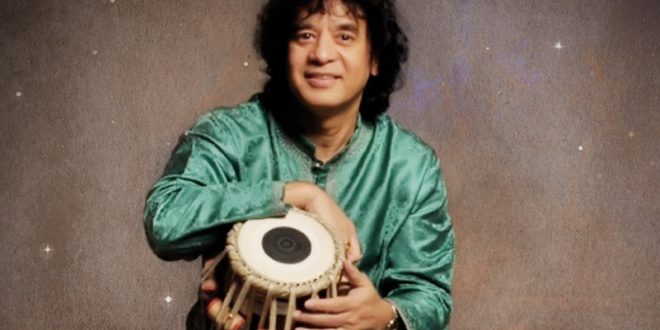(IANS)
An international force to reckon with in the world of music, classical tabla virtuoso Ustad Zakir Hussain says his tabla has been his mate since he was a baby, and the percussion instrument is the “hottest-selling” one worldwide, with India’s greatest bench strength being in it.
“Me and my tabla have been mates since I was a little baby. This is not work for me, it’s play, it’s a lot of fun. And, it’s the best play I can be in.
“(It is) The greatest toy that I have. It’s a friend, it’s a lover, a sister, a brother, it’s everything and that relationship has only, in some ways, deepened,” 67-year-old Hussain told reporters here, in response to an IANS question.
The 2002 Padma Bhushan recipient performed to a house brimming with music lovers, at the cultural centre Shriram Bharatiya Kala Kendra on Thursday evening, after a gap of over eight years.
The maestro, who is the subject of many documentaries and books, is the son and disciple of Ustad Alla Rakha Saheb, and started his illustrious musical journey by listening to him play the tabla.
Holding up his printed phone cover, Hussain proudly exhibited the photograph of his father’s hand blessing a young Hussain.
“I used to watch my dad, and even at 70, he used to be a very serious man. He’d get on the stage and suddenly a smile would appear on his face, and he would look like a little kid and have an absolutely fabulous time.”
The musician said he always prayed to have that kind of a relationship with his tabla, and with the art form. Is he there yet?
“I think we’re arriving there,” Hussain exclaimed with a smile.
He said that one can play music until the cows come home, but without visibility, one doesn’t get focus from the audience.
Recalled countrywide for his Taj Mahal Tea’s “Wah Taj” campaign, the Mumbai-born globally reputed player attributes his fame to his luck and the facial recognition the advertising campaign gave him, with even young audiences easily recalling his lean frame, curly hair and an infectious smile.
“There’s facial recognition, the ‘ah, it’s him!’ factor. That has helped a lot.
“What happens is, once you get people excited to come and see you play, and when they get to come after they’ve seen a 30-second commercial, then it’s up to you to turn it around and make them part of your fan club,” he said.
Now widely considered a chief architect of the contemporary world music movement, Hussain said he has been lucky that a lot of his audiences have stayed, and formed part of a support group over decades.
Also expressing his gratitude to the rock-solid support his colleagues and music fraternity gave him, the humble master, while tagging himself as a “regular tabla player”, said he is not climbing Kailash Parbat, but just pursuing his “first and last love” — tabla.
Referring to the ever-strengthening global position of the percussion instrument, he said that “one of the greatest bench strength in india music is in tabla”.
“There are more incredible tabla players than any other instrument in the world and the hottest selling instrument globally is tabla. So it’s arrived somewhere and people are having a great time with it. You can just bang away your frustrations!”
His contributions to world music have been hailed as unique, with many historic collaborations, including Shakti, which he founded with John McLaughlin and L. Shankar; Remember Shakti; the Diga Rhythm Band; Making Music; Planet Drum with Mickey Hart; Tabla Beat Science; and Sangam with Charles Lloyd and Eric Harland.
On his collaborations apart from classical tabla, he said he is just trying to reinvent himself.
“I have to. I’m trying to find a new language to tell the same stories. The story doesn’t change, we’re playing the same stuff that we’ve been playing for 300 years. But it is how you tell it, and the way it resonates with the audience,” the Sangeet Natak Akademi awardee said.
Asked about his recital, Hussain made sure to bring up the repertoire of his “incredible” collaborators: sarangi player Sabir Khan, mridangam player Anantha R. Krishnan and dholak player Navin Sharma, and sound engineer Mujeeb Dadarkar.
These are musicians who have proved them over and over again all over the world with me, and I’m proud to be sitting on stage with them, he quipped.
The iconic tabla genius held a riveting show here with his collaborations, ending in a standing ovation he more than deserves.
By Siddhi Jain
 Desi Today Magazine
Desi Today Magazine




